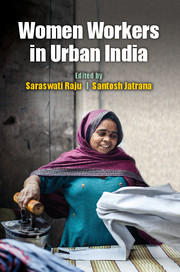Book contents
- Frontmatter
- Contents
- List of Figures
- List of Tables
- Preface
- 1 Setting the Backdrop
- 2 Women Workers in Urban India and the Cities
- 3 Gendered Vulnerabilities: Work-Life Trajectories of Female Domestic Workers in Jaipur
- 4 Occupational Domestication in a Post-Resettlement Context: An Analysis of Women's Work in Kannagi Nagar, Chennai
- 5 Old Jobs in New Forms: Women's Experiences in the Housekeeping Sector in Pune
- 6 Persistent Inequalities and Deepened Burden of Work? An Analysis of Women's Employment in Delhi
- 7 Spare Change for Spare Time? Homeworking Women in Banaras
- 8 Gender, Work and Space: Home-based Workers in Garment Industry in Kolkata
- 9 Labour Control and Responses: Women Workers in an Apparel Park in Kerala
- 10 New Urban Economic Spaces and the Gendered World of Work in Kolkata
- 11 Gender Equality and Women's Employment in the Banking Sector in India
- 12 Women Body Screeners and the Securitization of Space in Indian Cities
- Notes on Contributors
- Index
4 - Occupational Domestication in a Post-Resettlement Context: An Analysis of Women's Work in Kannagi Nagar, Chennai
Published online by Cambridge University Press: 05 May 2016
- Frontmatter
- Contents
- List of Figures
- List of Tables
- Preface
- 1 Setting the Backdrop
- 2 Women Workers in Urban India and the Cities
- 3 Gendered Vulnerabilities: Work-Life Trajectories of Female Domestic Workers in Jaipur
- 4 Occupational Domestication in a Post-Resettlement Context: An Analysis of Women's Work in Kannagi Nagar, Chennai
- 5 Old Jobs in New Forms: Women's Experiences in the Housekeeping Sector in Pune
- 6 Persistent Inequalities and Deepened Burden of Work? An Analysis of Women's Employment in Delhi
- 7 Spare Change for Spare Time? Homeworking Women in Banaras
- 8 Gender, Work and Space: Home-based Workers in Garment Industry in Kolkata
- 9 Labour Control and Responses: Women Workers in an Apparel Park in Kerala
- 10 New Urban Economic Spaces and the Gendered World of Work in Kolkata
- 11 Gender Equality and Women's Employment in the Banking Sector in India
- 12 Women Body Screeners and the Securitization of Space in Indian Cities
- Notes on Contributors
- Index
Summary
Introduction
In outlining the concept of ‘occupational domestication’, this chapter adds a spatial dimension to the familiar analyses of ‘women's work’ as a socially constructed category. For over two decades now, scholars have examined this category as a product of patriarchy's intercourse with capitalism. Marxist feminists have tracked the significant contributions of women, especially poor women, to capital accumulation not only through their household labour but also by providing an important source of cheap labour in waged work (Henessey and Igraham 1997 (1972), Dalla Rosa and James 1997 (1972)). More recent analyses of labour arrangements in settings of transnational or global capital — e.g., in electronics assembly, export-processing zones, and even in Silicon Valley (Ong 1987, Mohanty 1997, Anandhi 2007) — have noted how ideologies of domesticity, gendered definitions of ‘workers’ and ‘work’, and labour markets segmented by gender, race, and caste come to constitute specific work as ‘women's work’, thereby meriting lower wages and poorer working conditions. As Mohanty (1997) points out, industries source cheap labour by deskilling production and using race, gender and ethnic stereotypes to ‘attract’ groups of workers who are more ‘suited’ to perform tedious, unrewarding and poorly paid work. For example, certain kinds of factory jobs in the U.S. are targeted at women of Latin or Filipino immigrant communities, drawing on the community's culturally defined ideologies of women's place (ibid). Closer to home, Anandhi (2007), Kapadia (2010) and others have studied the large-scale employment of dalit women in export industries — garment, leather, software and pharmaceuticals — in or near urban centers. In Anandhi's case study of workers in a pharmaceutical export factory near Chengleput in Tamil Nadu, it was only young, unmarried women who were hired (in contrast to Ong's 1987 study in Silicon Valley, where only older married women were hired); this ensured that women could perform physically arduous work for long hours, on contract basis for very low wages.
Thus, the notion of ‘women's work’ as low-wage, unskilled and supplementary is aligned with the construction of women of particular castes, races or ethnicities as an appropriate and cheap labour force, ensuring continuities between women's unpaid domestic labour and paid market labour, and revealing the link between the feminization of work and the feminization of poverty in the global economy.
- Type
- Chapter
- Information
- Women Workers in Urban India , pp. 97 - 120Publisher: Cambridge University PressPrint publication year: 2016
- 1
- Cited by



